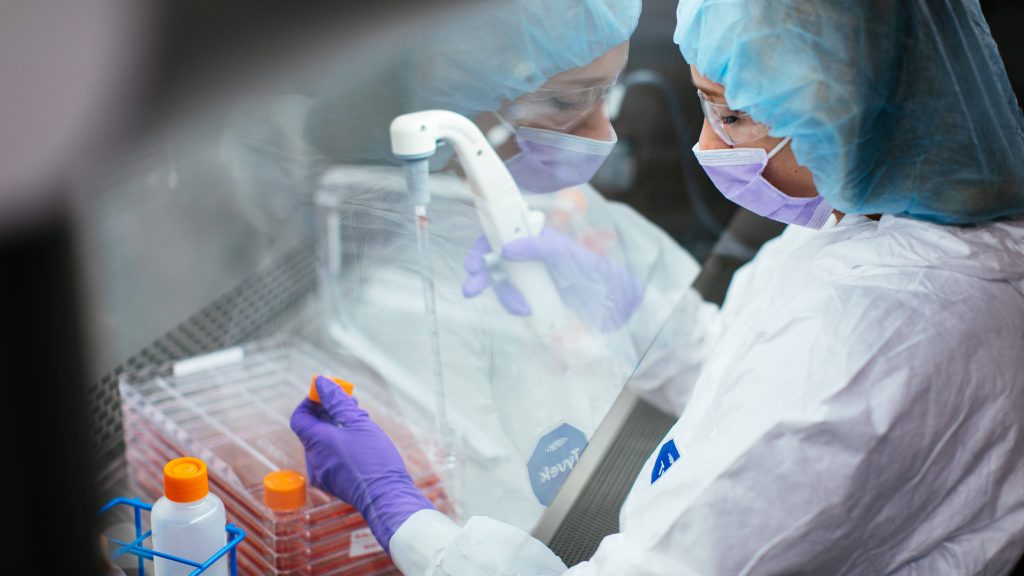-
Research
RegenBio Summit: Healing disease at its molecular roots

A clinician-researcher whose interest in collagen biology and improving the lives of patients drove his passion for discovering the first federally-approved gene therapy for genetic blistering diseases will deliver a keynote address at RegenBio Summit: Transforming Next-Gen Biotherapeutics 2024. Collagen is a protein that is a key building block for connective tissue and skin.
M. Peter Marinkovich, M.D., an associate professor of dermatology at Stanford University, will share the promises of advancing gene therapy for the skin disease epidermolysis bullosa from the lab to daily clinical care.
Register now for this event which will be held Dec. 9 to 11 at the Ponte Vedra Inn & Club in Ponte Vedra Beach, Florida.
"It's an exciting new era in dermatology and all of medicine. It used to be that we'd talk about gene therapies at research meetings, and now we're presenting on it clinical conferences," says Dr. Marinkovich. "I will be sharing the advancements we've made in the emerging field of gene therapy, particularly for blistering skin disease. The lessons we've learned could apply to developing new biotherapeutics for many types of diseases."
Dr. Marinkovich is a faculty member of the Program in Epithelial Biology and the Stanford Cancer Biology Program. His research focuses on psoriasis and skin cancer in addition to inherited autoimmune blistering diseases.
Targeting the molecular origins of disease
As an army medic decades ago, Dr. Marinkovich treated soldiers who suffered burns, wounds and other painful skin injuries. Later when he started working with genetic blistering disease patients, he became frustrated that available therapies were limited to only easing symptoms. That motivated him to research new options. Dr. Marinkovich's team is credited with developing the first Food and Drug Administration (FDA)-approved gene therapy for epidermolysis bullosa. Epidermolysis bullosa is a genetic skin disease caused by defects in the membrane between the outer and middle layers of skin that causes blisters in response to minor trauma.
"Our research started with a cell-based regenerative medicine approach, and then moved to an in vivo gene therapy approach. Finally, our research resulted in the first in vivo topical gene therapy for healing blistering skin disorders," says Dr. Marinkovich. "This pioneering approach delivers healthy copies of the defective genes directly into damaged cells to restore healthy skin."
In vivo refers to therapies that take place within a living organism versus a in laboratory dish or test tube.
Developing this new gene therapy from preclinical studies to a standard of care therapy was not without its challenges. Dr. Marinkovich estimates it took six years and meticulous patient and scientific data to advance it from the lab through clinical trials and FDA approval.
"I just want to encourage investigators to continue all of the great efforts to advance new biotherapeutics and not feel discouraged. I think it's a bright future right now in the field of molecular, corrective therapy," says Dr. Marinkovich.
Besides the keynote address on gene therapy, the RegenBio Summit: Transforming Next-Gen Therapeutics 2024 will offer sessions on gene editing, tissue engineering and navigating the regulatory approval process. Mayo Clinic will also share its blueprint for biomanufacturing early-stage therapeutics that could seamlessly be transferred to industry collaborators to bring to market for broader patient access.
"Mayo Clinic is leader in bringing life changing biotherapeutics to patients. We are really excited to share our knowledge with those who can help integrate this into the practice for all patients who need them," says Saranya Wyles, M.D., Ph.D., a dermatologist and associate director for education in Mayo Clinic's Center for Regenerative Biotherapeutics. "The RegenBio Summit will provide education on new tools in the emerging field of regenerative biotherapeutics that show promise of providing biologically based treatments for patients with few or no therapeutic options."
In addition to Dr. Marinkovich, the other keynote speakers at the summit will be:
Peter Marks, M.D., Ph.D., director of the Center for Biologics Evaluation and Research at the FDA, who will talk about regulatory programs to accelerate cell and gene therapies toward FDA approval and will speak about the FDA's commitment to approving safe and effective products to provide new healing options.
Birgit Schultes, Ph.D., senior vice president, Intellia Therapeutics Inc., who will discuss preclinical research using the CRISPR Cas-9 gene editing tool to generate cell therapies for cancer and autoimmune diseases.
The summit will also feature plenaries, networking events and poster sessions. Visit the summit website to register and to see the latest updates on new speakers and breakout sessions.
Investigators may submit proposals for poster presentations until September 6.
###
Related stories:
RegenBio Summit: Could a molecular scissors heal disease?
Mayo Clinic RegenBio Summit 2024 registration opens, keynotes announced







